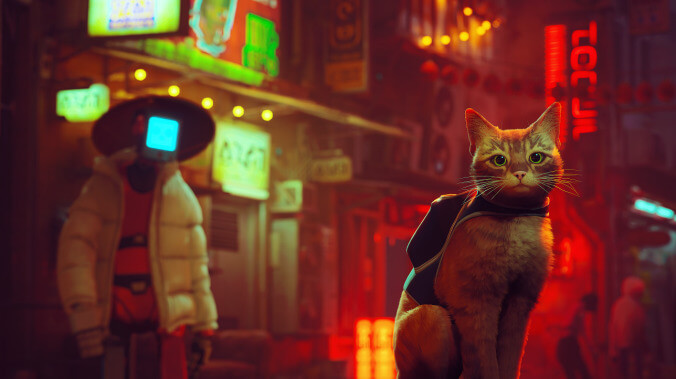Stray is short, sweet, and a must-play for cat lovers
We didn't realize such purrfect cat animations were even pawsible. Sorry. Sorry! (It's great, though)

We try not to be prescriptive here when we talk about how to play video games, there being, as the old blog title used to say, no wrong way to play. That being said, there is an objectively correct way to play Stray, the new puzzle platformer from developer Blue Twelve Studio and publisher Annapurna Interactive: With your own kitty cat curled up against you on the couch, as you navigate the game’s central character, a very capable orange tabby, through a cyberpunk dystopian world.
Because make no mistake: Stray is a game for cat lovers, by cat lovers, with the title’s single biggest selling point being the loving way your feline protagonist has been rendered and animated, every motion pulled from familiar cat movements and behaviors. (This is, as far as we know, the first ever video game to present every new carpet as a fresh opportunity for making biscuits.) Watching the cat (never named) move through the world Blue Twelve has created for it is often jaw-dropping, both in its technical execution, and its specificity. Some of the design choices can feel superfluous—your cat can, for instance, meow at any time, which is very rarely useful for stealth and not much else—but if you accept that the primary reason for playing the game is to, well, be a cat, then it’s frequently sublime. (Also, if you’re on the PlayStation, the meows come from the controller’s built-in speaker, which is an excellent way to annoy your own real-life felines.)
The world the cat inhabits, unfortunately, can’t quite match that specificity—an underground city populated entirely by robots and other cast-offs of an absent humanity, it sometimes feels kludged together from a Lego stack of ready-made video game tropes. It doesn’t help that the gameplay of Stray is fairly simple, beyond its various feline grace notes: You run, you meow, you occasionally scratch a wall, and you jump. The latter, one of your most common actions, isn’t a free leaping situation, either, but a matter of finding the right place to point the cat toward and then hitting a button to execute the leap. Exploration is still possible, sometimes even exciting, as you scour the city for collectibles and missing memories for your robotic companion B-12, and press onward toward the distant surface. But the repetition can wear: You’re going to jump on a lot of old air conditioners and leap over a lot of railings by the time the game is done. (About six or seven hours in, by our estimation, for a fairly exploration-heavy run.)
All of this, again, is ameliorated by: Cat. Whether in quiet exploration or in the occasional action scenes (which alternate throughout the game’s runtime) the cat always looks right—even if its problem-solving skills and unflagging focus sometimes defy belief as it solves puzzles, pulls levers, and avoids the deadly threats that inhabit the city.
Which brings us to an issue that may be looming for some people who’ve been curious about Stray for years now, and which we’ll address in a sidebar here so as to quarantine spoilers. To wit: Do bad things happen to the cat in Stray?
Hello, and welcome to the “Do bad things happen to the cat in Stray?” sidebar! The answer to this question, without getting too deep into spoiler territory, is that they can—this is a video game with enemies and fail states, so you may see a cute kitty with the word “DEAD” printed over it in cyber-block letters if things go wrong. There are also a few instances in which the cat falls from somewhere high up and then limps for awhile, which might be affecting for you, especially given the quality of the game’s animation. But the violence in Stray is generally much more abstract than graphic, and beyond those two things, you should probably be in the clear. Okay, sidebar done!
Despite some caveats, we can’t deny that Stray occasionally busts out a moment of real beauty, as when you first wander into the neon-soaked streets of the subterranean city of Mid-Town, recreating the stunning concept art that helped build hype for the game oh so many years ago. And while none of the dozens of robots you’ll meet (besides B-12, your constant companion) have even an iota of the personality of the cat itself, the game occasionally slips in a poignant note about the way our creations end up emulating both our best, and our worst traits.
Really, though, your interest in Stray is going to come down to two factors, one very prosaic, and one pretty abstract. First: Do you currently have PlayStation Plus Premium? This is, after all, the first game since Sony revamped its subscription Plus program to attempt to do a Microsoft Game Pass-style “available at launch” thing, and at “no extra dollars,” it’s interesting enough, and brief enough, to be a more-or-less an instant recommendation.
Second: Do you love cats? Love watching them move, jump, swat things off shelves, make a mess, be weird little guys, etc.? Because Stray is the best job anyone’s ever done at capturing those pleasures in video game form. If you spend too long playing it, treating it like a video game, the awe of its animations can occasionally wear off, become commonplace. Take our advice, and step away when that happens. Shut the game off for a bit. Come back to it and make an effort to ignore the robots, the squalor, the endless jumping. Just watch the cat move. Watch it be a cat. It’s a hell of a thing.